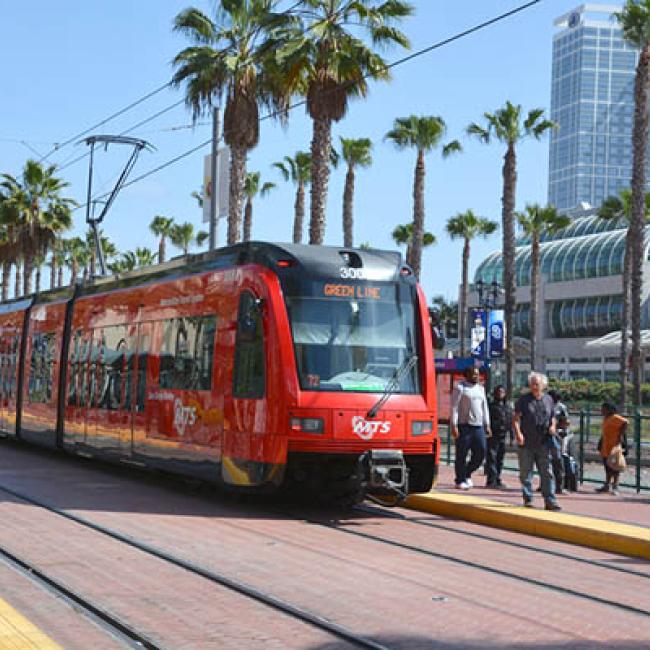Project Summary
The project team is evaluating longitudinal changes in multiple health, economic, and environmental outcomes over a 3-year COVID recovery period and in the context of a new light rail transit (LRT) line, called the Mid-Coast Trolley, among 465 UC San Diego (UCSD) staff. The primary aim is to evaluate change in objectively measured total and moderate to vigorous physical activity (MVPA), travel mode, and vehicle miles traveled (VMT). (Originally titled: TROLLEY Study - TRansit Opportunities for HeaLth, Livability, Exercise and EquitY)
Research Questions/Aims
- Do minutes of MVPA and proportion of active transportation (bike, walk, transit) trips, as a share of total trips, increase over this time period and what is the effect of the new LRT?
- Do vehicle trips and VMT decrease over time in those who live within 1 mile of LRT stations, compared to those who have less access to LRT?
- How do transit and COVID-19 perceptions and infection/vaccination status relate to LRT use?
- Does household income, race/ethnicity, sex, children in household, neighborhood environments (i.e., walkability), and distance to LRT modify observed changes in multiple outcomes?
Actionability
- Provide practitioners in multiple sectors, government agencies, employers, and public health decision makers with evidence of the impact of transit investments in their communities.
Outcomes
Health & wellbeing: Physical activity (total and MVPA minutes/day), depressive symptoms, perceived quality of life, stress, and BMI measured across income, sex, and racial/ethnic groups
Other: Vehicle miles traveled, household expenditures, transportation costs
Methodology
The project team will assess longitudinal changes in outcomes at 3 measurement time points, with 2 years of follow up. They are recruiting an equal number of participants from areas nearby transit stops (within 1 mile) that connect to the new LRT line and further from transit stops (3+ miles) to compare outcomes between these groups. The investigators are using multilevel mixed effects linear (for continuous outcomes) or multinomial logistic (for categorical outcomes) regression models. Physical Activity (PA) will be measured using Actigraph accelerometers. PA disparities reduction will be assessed based on the percentage of participants who meet PA guidelines of 150 minutes of MVPA per week. GPS devices will be used to determine PA location and trip/commute mode. Additionally, the proportion of household income expended on transportation costs will be estimated, which will serve as an equity measure.

University of California, San Diego
Urban Design 4 Health
The San Diego Metropolitan Transit System
The San Diego Association of Governments (SANDAG)
San Diego County Bicycle Coalition
Climate Action Campaign